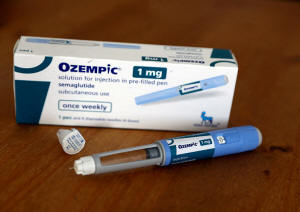Novo kidney trial finds Ozempic cuts cardiac risks in diabetics
 Send a link to a friend
Send a link to a friend
 [March 05, 2024]
By Stine Jacobsen and Maggie Fick [March 05, 2024]
By Stine Jacobsen and Maggie Fick
COPENHAGEN (Reuters) -Novo Nordisk's widely used diabetes drug Ozempic
delayed progression of chronic kidney disease in diabetes patients, a
large late-stage study found, cutting the risk of major cardiac events
and death by 24%.
Around 40% of people with type 2 diabetes have chronic kidney disease
and some 700 million patients are affected globally, according to the
Danish drugmaker.
Novo stopped the trial in October, almost a year ahead of schedule,
because it was clear from an interim analysis that the treatment would
succeed.
"The trial achieved its primary endpoint by demonstrating a
statistically significant and superior reduction in kidney disease
progression, major adverse cardiovascular events (MACE) and death of
24%," Novo said in a statement on Tuesday.
The trial results are the latest indication that drugs from the GLP-1
class have medical benefits for conditions beyond type 2 diabetes and
weight-loss, their initial purposes.
Novo shares, which are up 24% so far this year, were down 1.6% at 1043
GMT, after hitting a record high in early trade.
The 24% reduction in the risk of kidney disease-related events was
slightly below some investors' expectations, analysts from Sydbank and
Jefferies said.

The trial called FLOW started in 2019 and involved roughly 3,500
patients with type 2 diabetes and moderate to severe chronic kidney
disease who were given 1 milligram (mg) of once-weekly semaglutide in
addition to standard care.
[to top of second column]
|

A box of Ozempic and contents sit on a table in Dudley, North
Tyneside, Britain, October 31, 2023. REUTERS/Lee Smith/File Photo
 "The positive results from FLOW
demonstrate the potential for semaglutide to become the first GLP-1
treatment option for people living with type 2 diabetes and chronic
kidney disease," said Novo's head of development, Martin Holst
Lange.
Shares in dialysis companies DaVita and Fresenius
Medical tumbled last year after Novo announced the early trial
success. The dialysis market has for decades been sustained by high
rates of obesity and diabetes, which contribute to kidney damage.
The potential for GLP-1s to treat health problems beyond diabetes
and obesity has also hit shares in bariatric surgery providers, food
firms and glucose-monitoring device makers.
Semaglutide is also the active ingredient in Novo's powerful
weight-loss drug Wegovy. Both belong to a class of drugs known as
GLP-1 analogues, which mimic hormones and in turn reduce appetite
and increase the feeling of fullness after eating.
Novo said it plans to submit an application to EU and U.S.
regulators for a label expansion for Ozempic this year.
(Reporting by Stine Jacobsen and Maggie Fick; Editing by Josephine
Mason, Terje Solsvik and Alexander Smith)
[© 2024 Thomson Reuters. All rights reserved.]This material may not be published,
broadcast, rewritten or redistributed.
Thompson Reuters is solely responsible for this content. |